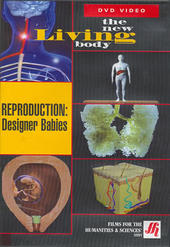Young Children’s Voices in Mathematical Problem Solving
Contributed by Dr Ho Siew Yin and Sng Wei Qin Abbie, from NTUC First Campus, for SingTeach Virtual […]
Read More
Films for the Humanities and Sciences (2004); A Granada production for Channel 4. Produced by Nick Peake. NJ: Princeton.
DVD Length: 20 mins
 How does reproduction take place? What are some of the more desirable characteristics for humans? Should parents be allowed to choose the traits they want for their children? Who governs the decision of which traits are favoured? Does this lead to different classes of people in the world?
How does reproduction take place? What are some of the more desirable characteristics for humans? Should parents be allowed to choose the traits they want for their children? Who governs the decision of which traits are favoured? Does this lead to different classes of people in the world?
The above are just some of the issues explored and questions raised in Reproduction: Designer Babies. This 20-minute docu-movie is part of a series of 10 DVDs on The New Living Body, exploring the complexities of the human body and scientific advancements that have enabled us to better understand ourselves.
This docu-movie can be used as a summary upon completion of the chapter on “Reproduction in Man” in Biology.
Reproduction: Designer Babies offers a comprehensive summary of the male and female reproductive organs and the process of reproduction, and is useful for reviewing the topic. It explores the conception process, reasons for infertility, in-vitro fertilisation, and techniques available for monitoring the foetus during pregnancy. Each subtopic is explained with animated illustrations, clear narratives, and electron micrograms.
Alternatively, teachers can use this video as a platform for discussion and to infuse critical literacy in class. Students can be asked to research and debate these issues, to substantiate what they are saying, and to take a stand based on what is discussed.
The video then offers us a glimpse into the future. It envisions a world where parents-to-be can “design” their babies through the process of genetic selection made possible by the mapping of the human genome. This section provides a platform for further discussion on the many ethical issues surrounding the advancements in biomedical sciences.
By demonstrating how science is being applied in real-life situations, the video takes students beyond the scientific content of reproduction in man and helps them understand that science is not just about facts, but also about policies, people’s lives, and the society at large.
This documentary is strongly recommended for teachers who seek to develop students who are truly scientifically literate.
Location of DVD: NIE Library